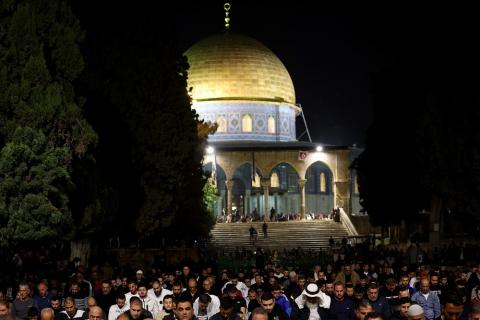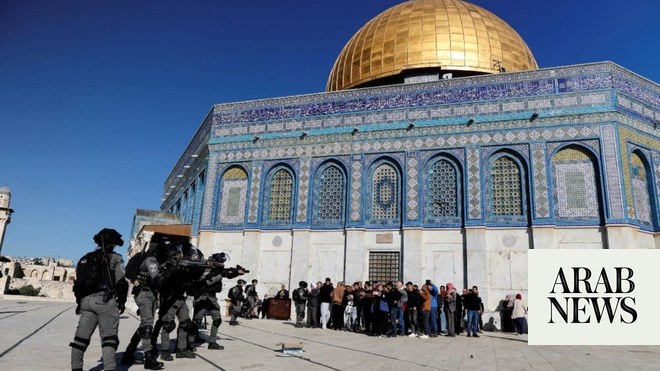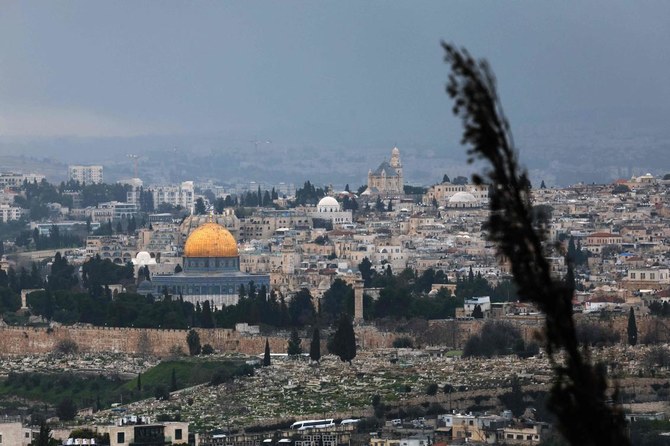
Israeli ambassador summoned for ‘strict and clear condemnation’
Palestinians angry over the Israeli police actions last Friday appealed to Jordan to intervene
RAMALLAH: King Abdullah II of Jordan has intensified efforts to end Israeli measures against Palestinian worshipers at Al-Aqsa Mosque in Jerusalem during Ramadan.
On Monday, he contacted Abu Dhabi Crown Prince Sheikh Mohammed bin Zayed, Egyptian President Abdul-Fattah El-Sisi, European Council President Charles Michel, Qatari Emir Sheikh Tamim bin Hamad and Palestinian President Mahmoud Abbas.
During the talks, he stressed the need for Israel to end all actions in the mosque.
The king’s efforts came amid growing concerns that provocative behavior by Israel around the Al-Aqsa Mosque could undermine the chances of achieving peace.
Jordanian Foreign Minister Ayman Safadi said that Jordan had summoned the Israeli ambassador to inform him of his Amman’s condemnation of Israeli measures, and on Monday said it summoned the Israeli charge d’affaires.
“We summoned the Israeli ambassador, and we will summon the charge d’affaires to inform him of our strict and clear message in which we condemn the Israeli actions,” said the minister.
He added that Jordan would host a meeting of the Arab League committee next Thursday to confront “illegal Israeli measures” in Jerusalem’s holy sites.
Al-Safadi warned that if Israel did not stop “these illegal measures and their violations,” it would bear responsibility for increasing tensions.
Foreign ministry spokesperson Haitham Abul Ful said the Israeli charge d’affaires was handed a letter, carrying Jordan’s rejection of the “illegal and provocative” measures in Jerusalem and its assaults against worshippers at Al-Aqsa Mosque - Islam’s third holiest shrine.
Abul Ful said that Jordan also demanded Israel respect the freedom of worship and “immediately” cease its assaults and attempts to change the historical and legal status quo at the Al-Aqsa Mosque / Al-Haram Al-Sharif.
“The Israeli actions are a serious escalation and a violation of the international law and Israel"s obligations as the occupying power,” the spokesperson said.
The decision to summon the Israeli ambassador comes as national groups in Jordan continue their solidarity with worshipers in Al-Aqsa and their massive demonstrations until the end of Ramadan.
Israel reacted with concern to Jordan summoning its ambassador in Amman on Monday.
Palestinians make up a large percentage of Jordan’s population. Tens of thousands live in refugees camps on the outskirts of Amman and their protests in solidarity with Al-Aqsa may pose a challenge to security and stability.
Although Egypt and Qatar had mediated between Hamas, Islamic Jihad and Israel to prevent further security escalations, Palestinians still believe that only Jordanian pressure can stop further Israeli restrictions in Al-Aqsa during Ramadan.
Israel had asked King Abdullah to mediate with Palestinian President Mahmoud Abbas before Ramadan so that there would be no tension in Jerusalem during the holy month.
King Abdullah visited Ramallah on March 28 to meet Abbas. They agreed to work to calm the situation on the eve of the start of Ramadan.
Before the meeting, he received Israeli Foreign Minister Yair Lapid in Amman and in the same week Israeli Defense Minister Benny Gantz and the Israeli President Isaac Herzog in an attempt to prevent the deterioration of the security situation during the holy month.
Sheikh Azzam Al-Khatib, director of the Islamic Awqaf in Jerusalem, a department affiliated with the Jordanian Ministry of Awqaf and Islamic Affairs in Amman that employs 800 people who guard Al-Aqsa, said in an interview with Arab News that the Israeli policy toward Al-Aqsa is “very dangerous.”
He added: “Any Israeli violation will be met with a protest and a strong Jordanian stance from King Abdullah II, because the religious and legal position is that Al-Aqsa Mosque does not accept division or partnership and is the property of Muslims, and any prejudice to that means a violation of the principles on which King Abdullah II was brought up, on the importance of preserving Islamic and Christian sanctities in Jerusalem,” he told Arab News.
Palestinians are concerned that Israeli authorities will divide Al-Aqsa Mosque between Muslims and Jews, as they did several years ago in the Ibrahimi Mosque in Hebron.
Israel meanwhile closed the Ibrahimi Mosque on Monday and Tuesday in front of Muslim worshipers, in order to enable Jewish worshipers to perform Passover prayers.
Palestinians angry over the Israeli police actions last Friday appealed to Jordan to intervene and questioned King Abdullah’s position on protecting Al-Aqsa.
A number of them wrote posts on social media. One said: “Al-Aqsa Mosque does not need to be carpeted, but rather needs the protection of those who lead it to pray in Ramadan.”
The Hashemites have been the guardians of Islamic holy sites in Jerusalem for 100 years. Even after the 1967 war, during which Israel occupied East Jerusalem, the Jordanian guardianship of Al-Aqsa remained in place. The position was consolidated during the 1994 Israeli-Jordanian peace treaty — better known as Wadi Araba — that was signed between the late King Hussein bin Talal and the then Israeli prime minister Yitzhak Rabin.
“It is natural to summon the Israeli ambassador in Amman and protest to him, and it is important for the Israeli people to know that there are extremist right-wing Jewish parties that are working to offend them by leading a religious war against Muslims in this country,” said Al-Khattib.
He added: “Any violation of the sanctity of Al-Aqsa Mosque concerns the whole world, especially King Abdullah.”
The said added: “We want peace to prevail in this region. It does not harm the sanctities from any side, and that the specter of religious war is kept away from it.”
The Palestinian Ministry of Foreign Affairs strongly criticized its Israeli counterpart and refuted Israel’s claim to support freedom of worship.
It said in statement that the Israeli Foreign Ministry “continues to manufacture lies and misinformation about the occupation state’s keenness on freedom of worship in occupied Jerusalem.”
It also noted that “hundreds of videos” had documented cases of worshipers being forced to leave the Al-Aqsa Mosque, as well as cases of “repression and abuse.”












